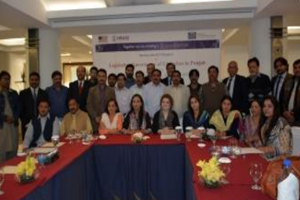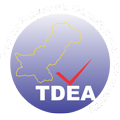Plugging the gap in educational legislative governance, by empowering the relevant standing committee of the provincial legislature, holds the promise of increased citizen-centered planning, need-based resource allocation and vigorous oversight. Towards this end, USAID Citizens’ Voice Project – through its partner organization Institute of Social and Policy Sciences (I-SAPS) – implemented a project titled ”Strengthening Educational Legislative Governance in Punjab”.

Active Citizen Group members pose for a group photo after a meeting on the operational methodologies for strengthening the legislative oversight of the education sector in Punjab.
The project generated evidence on the challenges faced by the provincial legislators with a view to:
- Generating demand for amending the Rules of Procedure related to standing committees;
- Exploring avenues for effective public engagement; and
- Improving legislative oversight of the education sector.
Through evidence-based advocacy, USAID facilitated formation of a caucus of Punjab Assembly members representing all major political parties. The caucus members met periodically to deliberate upon challenges faced by legislators in strengthening the education sector in the province, and in this context, strategically planned ahead to overcome these challenges.
In doing so, the caucus acted as a policy pressure group to advocate for amendments in the Rules of Procedure related to standing committees. By facilitating this advocacy campaign involving provincial legislators, members of Standing Committee on Education and Public Accounts Committee, civil society leaders, and journalists, the project ensured a participatory approach towards improving the educational legislative governance in Punjab.




















